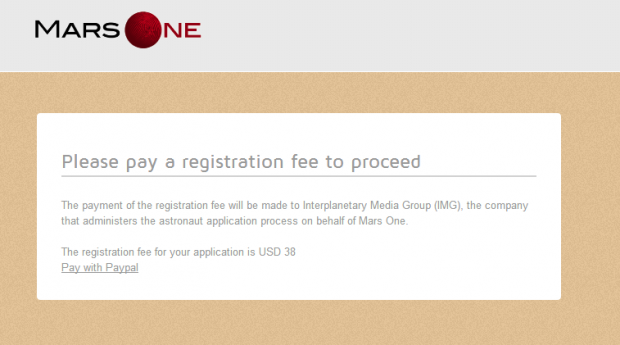You might remember a certain reality TV show we mentioned last week that will see contestants traveling to and living on Mars. Well, you can now submit an application to be part of the team when the journey starts in 2023. It’s going to cost you though. The application is around $38 (the price depends on what country you currently reside) just to look at. After filling out a preliminary application, interested parties then have to send in a short video, a well written self-introduction and a long list of personal interests.
According to project manager Bas Lansdorp the main goal of the mission is to establish a small human-inhabited colony on Mars.
“This is a human mission, a mission where humans are selected by the audience… They are our TV friends. We’ll see the group dynamics, the things that go wrong, and that’s what makes it interesting… that’s why it will stay interesting for a very long time.”
Norbert Kraft, a medical director for the project, says that once the pioneers reach Mars, they’re allowed to do as they wish and that includes covering up cameras for a little extra privacy.
“They can do whatever they want, what they think is best for themselves. If they don’t like a camera, they can put a piece of duct tape over it.”
When you think about it, he’s got a point since the trip itself will take a long time to make. Participants will be far out of reach, and it stand to reason that project directors will have no control over a small group of individuals who are located so far away. Then again, with a twisted mind like mine, I can come up with all sorts of ways to make the participants follow orders (think remote oxygen cutoff-ouch).
The whole concept is truly frightening to me. I may someday be okay to travel to Mars, but I certainly don’t need to be one of the pioneers, there are just so many things that can go wrong. Not to mention how long you’d have to wait for supplies to arrive if you run out of something.
Lansdorp seems to think that the show and its participants will see greatness comparable to that of the Olympic athletes when it’s made accessible globally on the internet. He also equates similar earnings for the project simply because so many people will be watching events unfold. For example, the 2012 Olympics in London saw a revenue stream in excess of $4 billion from watching audiences, and it occurred over a three week period. By the time the Mars One mission launches on 2023, Lansdorp estimates nearly four billion people will be connected to the internet and therefore able to watch the journey unfold.
As for what we can expect, Lansdorp had this to say:
“Where is this going? Of course, we don’t know… There might be delays, there might be cost overruns, there might even be failures… It can be done.”
If you ask me, that’s more of an ominous message than a positive one. Just the word “failures” makes me cringe at the possibilities.
Check out the source links for more in-depth information on the show and related space mission.
[via Ars Technica]

 Email article
Email article




